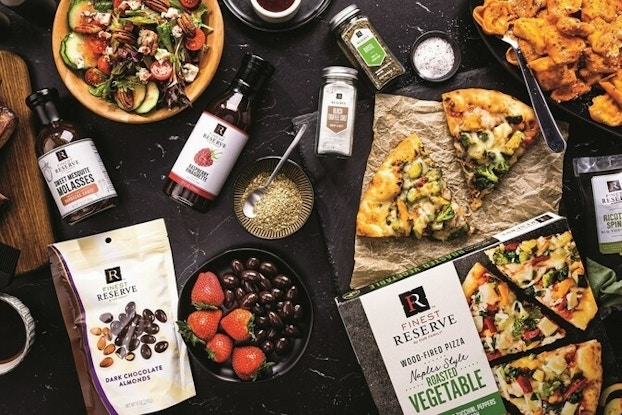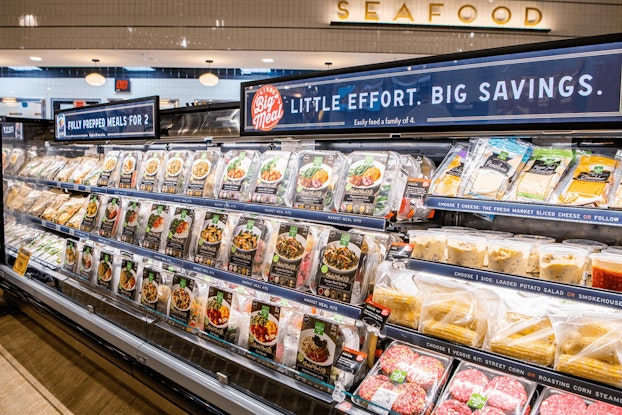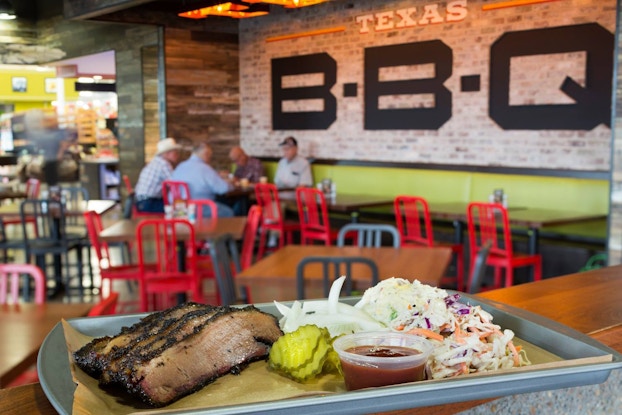
Why it matters:
- 25% of consumers said they were replacing quick-service/fast-casual restaurant meals with retail purchases, according to the Power of Foodservice at Retail report from FMI, The Food Industry Association.
- Meanwhile, spending on foodservice in supermarket delis rose 4.2% in 2023, to $49.9 billion, the report found.
- Against that backdrop and amid the rise of remote and hybrid work, grocery chains are making meal prep more convenient and upscale for consumers, helping them recreate restaurant-style dishes close to home, and even offering in-store dining experiences.
Grocery stores are seeking to capture an increasing share of consumers’ spending on meals by positioning themselves as convenient, high-quality, and affordable alternatives to restaurant dining.
Supermarket companies including SpartanNash, The Fresh Market, Gelson’s, Hy-Vee, and H-E-B are among those that have embraced this trend.

Interested in a small business membership?
Find out how the U.S. Chamber of Commerce can help your company grow and thrive in today's rapidly-evolving business environment. Connect with our team to learn how a small business membership can benefit your bottom line and help you achieve your goals.
Retailers and restaurants have long battled for what is sometimes called “share of stomach,” or the amount that consumers spend on groceries versus meals prepared in restaurants.
Economic factors play an important role in this competition for market share. During a strong economy, consumers are more likely to spend money on dining out at restaurants; and conversely, during challenging economic times, consumers tend to capitalize on the cost savings of buying meal ingredients at the grocery store.
While cooking meals at home became much more commonplace during the pandemic, consumers began returning to restaurants as restrictions eased. Grocery retailers have managed to retain some share of meal spending, however, by seeking to make meal prep more convenient for their shoppers and helping them recreate restaurant-style experiences.
The 2023 Power of Foodservice at Retail report from FMI — The Food Industry Association, the largest trade group for the retail grocery industry, found that shoppers have been increasing their spending on prepared foods from supermarket deli departments, where most prepared foods are sold.
Supermarket prepared foods are most likely to replace purchases at quick-service or fast-casual restaurants: The report found that 25% of shoppers said they were replacing these types of restaurant meals with retail purchases, up from 17% who said they were doing so in the preceding year.
It also cites data from NIQ (formerly Nielsen), showing that supermarket deli foodservice dollar sales grew to $49.9 billion in the year ending October 2023, up 4.2% from the year-ago period. The trend is expected to continue, according to the FMI report.
Among the factors favoring increased spending on grocery foodservice is the trend toward hybrid/remote work. Nearly 20% of shoppers reported consuming deli-prepared foods from grocery stores at least a little more often because of changes in their remote-work situations, with lunch seeing the biggest gains from these changes.
SpartanNash focuses on meal solutions: ‘Discerning shoppers’ won’t sacrifice quality or flavor
Tony Sarsam, CEO of grocery retailer and wholesaler SpartanNash, said consumers are seeking indulgent food experiences and looking for local flavors and brands. SpartanNash has been seeking to appeal to these customers with innovative solutions that offer convenient and affordable fresh meal options, such as its restaurant meals to go.
“Our discerning shoppers are increasingly prioritizing value without wanting to sacrifice quality or flavor,” he said.
Tony Sarsam, CEO of grocery retailer and wholesaler SpartanNash, said consumers are seeking indulgent food experiences and looking for local flavors and brands.
This has led to the recent launch of the company’s Finest Reserve by Our Family private-label line, which brings sophisticated flavors and products to its own brand portfolio, while maintaining a focus on value.
“This assortment is meant to exceed our customers’ expectations and provide an even more elevated and refined private-label experience, especially in home-cooking scenarios,” Sarsam said.
The collection includes artisan-crafted frozen pizzas, upscale pastas, sauces, dressings and marinades, premium spices, salts and seasoning blends, as well as chocolates and wines.
“It is designed to engage the senses with authentic flavors and a fresh take on traditional ingredients,” with a goal of helping customers create memorable meal experiences at home, Sarsam said.
Food manufacturers have also sought to appeal to consumer demand for convenience when it comes to meal preparation. They are offering more of what Sarsam described as “just add” products, which make it easy for consumers to prepare meals, like with the addition of water or eggs, for example.
These include the increasing variety of just-add-water Asian noodle products that mirror the on-trend dishes available in restaurants, such as ramen and pho, which are available from companies like Lotus Foods and Snapdragon. Instant breakfast meals include the Just Crack an Egg line of instant breakfast scrambles, which allow consumers to make an easy at-home breakfast with just the addition of an egg. Consumers are also gravitating toward “just-add” baking mixes for a variety of treats, from cookies to brownies and cupcakes.
“There is a continuum of convenience, and the most expensive items are usually the most convenient, ready-to-eat, grab-and-go options,” Sarsam said. “On the other end of the continuum, you have white flour and other raw ingredients. We’re seeing most consumers settling in the middle with ‘just add’ options becoming more and more popular.”
The SpartanNash private-label assortment has also been gaining market share, and Sarsam said he expects continued momentum with new product innovation. In addition to more natural, organic, and plant-based products, planned introductions also include grab-and-go options such as premium, fresh-cut fruits and vegetables, grilled-to-order paninis, store-made artisan sandwiches, and party platters for entertaining.
Demand for convenient meal solutions is expected to continue to grow, he said.
“As a result of the macro-economic trends, families are still cautious about their discretionary spending, and we anticipate they will continue to depend on grocery stores for simple, yet sophisticated meal options,” Sarsam said.

From ‘Little Big Meals’ for families that mimic restaurant fare to livestream cooking demos
Some grocery retailers, such as Gelson’s and The Fresh Market, have long helped their customers solve their meal-preparation needs.
The Fresh Market, with 162 stores across the East Coast and Midwest, is among the grocery retailers that have now placed an emphasis on making restaurant-quality meal preparation a central aspect of their competitive positioning. Among its recent initiatives is an offering called “Little Big Meals” that provide meal solutions that mimic the offerings consumers might otherwise find only at restaurants. The meals include everything needed to quickly make dishes such as fajitas, street tacos, meatloaf or stir fry (the options change weekly).
They’re priced “to feed a family of four without eating your budget,” the retailer says.
The company has also been on the leading edge when it comes to helping customers create at-home holiday meals. It is one of the few supermarket chains that have embraced livestream shopping, giving cooking tips, recipes, and holiday meal-planning advice, complete with shoppable links.
Recent livestreams have included tips for making a Mother’s Day brunch, with a recipe demonstration for apple fritters and some suggestions for wines and flower arrangements; and Cinco de Mayo Fusion Style, with tips for creating a menu of tamales, tacos, chips and dip, margaritas, and other fare.
Gelson’s, meanwhile, which operates 28 supermarkets in Southern California, has also embraced the concept of offering restaurant-quality meals, with its “What’s 4 Dinner” four-person heat-and-eat packaged meal kits and its “Dinner 2 Nite” heat-and eat meals for two.
“Sit back, relax, and enjoy two servings of a restaurant-quality meal prepared by our chefs,” the retailer says in its promotion for the meals.
Options include a citrus garlic tri-tip kabob with vegetables, chicken Romano with pasta and asparagus, and many others, including some plant-based options. The meals are fully cooked and refrigerated and come with reheating instructions.

Branded in-store restaurants: ‘It doesn’t feel like you’re in a grocery store anymore’
Still, other supermarkets, including Hy-Vee and H-E-B, have taken restaurant-quality meals a step further and opened full-scale branded restaurants inside their stores.
Hy-Vee, for example, which operates more than 300 grocery stores across the Midwest, is well-known for its variety of in-store restaurants. It’s Chinese prepared-food offerings, dubbed HyChi, have loyal followings of fans, and it operates in-store food courts that feature multiple restaurant brands, including The Hibachi, Mia Pizza, Nori Sushi, and others. Hy-Vee also has a partnership with Wahlburgers (the chain from the celebrity Wahlberg brothers) to operate its restaurants in some of its supermarkets.
H-E-B, a regional operator operating most of its 400-plus locations in Texas, has also been at the forefront of the in-store restaurant trend. It recently opened an in-store food hall called Main Streat by H-E-B Food Hall & Bar at a supermarket in Austin, offering six different branded foodservice concepts. It also has about two dozen in-store barbecue restaurants called True Texas BBQ, and operates other concepts focusing on pizza, sushi, grilled chicken, Mexican food, and one location of a seafood restaurant called True Texas Boil in Houston.
H-E-B’s True Texas BBQ, in fact, was named the best barbecue restaurant chain in Texas by Texas Monthly magazine in 2019.
“Each location of True Texas BBQ is designed like a stand-alone restaurant—with an ordering counter, tables, and fountain drinks,” the magazine explained. “It doesn’t feel like you’re in a grocery store anymore.”
CO— aims to bring you inspiration from leading respected experts. However, before making any business decision, you should consult a professional who can advise you based on your individual situation.
CO—is committed to helping you start, run and grow your small business. Learn more about the benefits of small business membership in the U.S. Chamber of Commerce, here.







